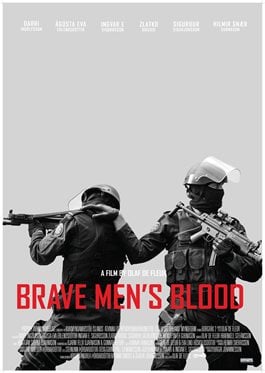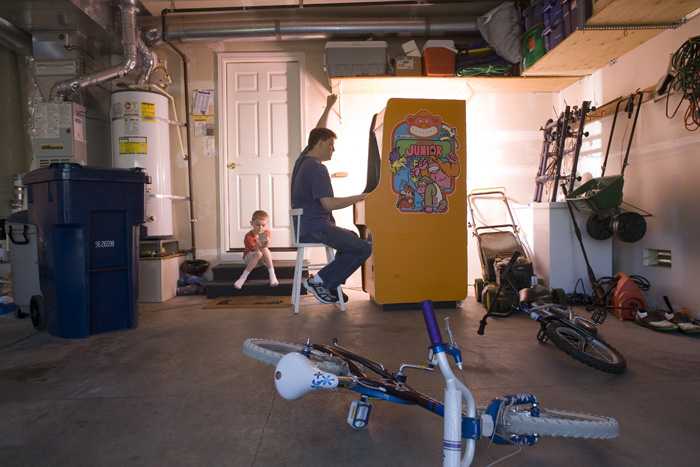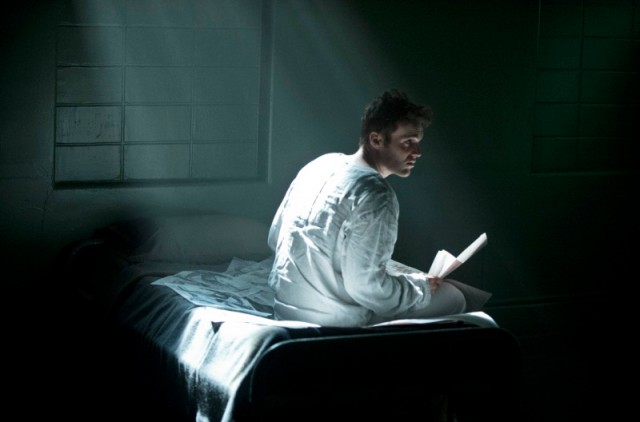 Brave Men’s Blood
Brave Men’s Blood
Written Hrafnkell Stefansson and Olaf de Fleur
Directed by Olaf de Fleur
Iceland, 2014
Structurally, it’s hard to find much fault with Brave Men’s Blood, an Icelandic film from director Olaf de Fleur, set to premiere on VOD on September 8th. It’s a crime thriller without much fat, and it does an admirable job of jumping straight into the action. At the same time, the film ends up feeling like it could’ve used more fat, as what remains is a fairly dry tale of police corruption and organized crime which doesn’t do much to stand out or warrant its existence.
Some of what little fat there is in the film can be found in the opening scenes, as a young cop, Hannes (Darri Ingolfsson), tries and fails to join a SWAT team. His failure is mere character exposition, though—the meat of the narrative comes once his father (Theodor Juliusson), a police veteran himself, helps get Hannes hired as head of Internal Affairs. Shortly after getting the job, he’s put to work, as an imprisoned kingpin, Gunnar Gunnarson (Ingvar E. Sigurdsson) informs him of the cooperation between narcotics division head Margeir (Sigurdur Sigurjonsson) and Serbian crime lord Sergej (Zlatko Krickic).
Naturally, Hannes doesn’t plan on taking out Margeir and Sergej on his own, and he recruits Andrea (Agusta Eva Erlendsdottir), a narcotics cop and former employee of Margeir’s, to help him out. She’s eager to help due to being put on desk duty after a nervous breakdown following an assault, but this bit of information functions more as a boring stereotype attributed to a female character than a compelling motivation. De Fleur’s attempt to involve a woman in the boy’s club of his film’s universe isn’t wholly laughable, but whatever he does achieve gets undermined by sticking her with a female trait as obvious as emotional instability.
Despite the tired trope, de Fleur at least has the decency to grant her with screen time, which can’t be said of the film’s only other primary female character, Hannes’s wife, Ragna (Thora Bjorg Helga). After a gratuitous sex scene early in the first act which appears to be nothing more than an attempt to humanize Hannes (did de Fleur worry we wouldn’t think Hannes had sex with his wife?), she gets attacked by a vicious car crash in an attempt to intimidate him. The attack seems calculated to grant the story with some emotional stakes, but de Fleur does so little to develop the character that it’s hard to summon much emotion. It’s an attempt at shock value, and not a very successful one.
A failed attempt at fleshing out this story can also be found in Hannes’s relationship with his father, which, like the attack on Ragna, tries to add emotional weight to the narrative. Given that Hannes is the son of a cop, de Fleur appears to suggest, he should be even more motivated to do his job then if he were, you know, any old head of Internal Affairs. But de Fleur doesn’t do enough with the relationship to establish this sort of motivation, and the father ultimately serves as nothing other than a distraction from the narrative focus.
What these familial subplots really attempt to distract from, though, is the overall dullness of Hannes himself. Outside of the burdens of his wife’s injuries and father’s expectations, de Fleur reveals no details of the protagonist’s life outside of his job, and the result is a character who fails to engage our attentions. The guy seems likable enough, but that’s far from enough to sustain a feature film.
Still, de Fleur’s attempts at inserting details about Hannes’s life aren’t quite as clumsy as his efforts with Sergej, which constitute the film’s weakest moment. In a flashback which seems to appear almost at random, de Fleur informs the viewer of Sergej’s past in Belgrade. Rather than fleshing out the character, though, they simply detract from whatever motivation the film builds in the present. The flashback ends without revealing much about Sergej, and it obscures whatever information Brave Men’s Blood was approaching explaining about its other characters.
Accordingly, these ungainly bits of exposition constitute what little fat the film does have, and they obscure a thriller narrative which is otherwise cleanly laid out. Brave Men’s Blood has a tight seven act structure, and it’s one which moves at a brisk pace, even in spite of the expositional faux pas. But as a result of those faux pas, Brave Men’s Blood is left without much emotional weight, and what remains is a rote cop drama which fails to stand out.







